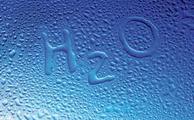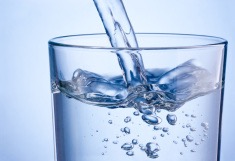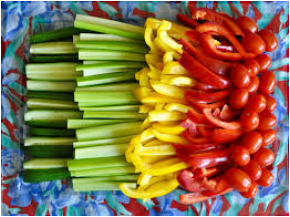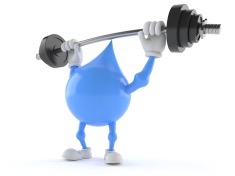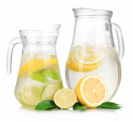What does water do for my body? Water is a nutrient essential to life. It is the primary component of all bodily fluids - blood, lymph, digestive juices, urine, tears, and sweat - and is involved in almost every bodily function. Water makes up 60% of our total body weight and is second in importance only to air for sustaining life. It is impossible to sustain life for more than a week without it. Should I drink only when thirsty? Thirst is not fully reliable. Thirst is a signal that your body is already on its way to dehydration. It is important to drink more than thirst demands and continue to drink throughout the day .
Dehydration Without enough water, we literally dry ourselves out. Dehydration is linked to chronic health problems like arthritis, diabetes, colitis, high blood pressure, kidney stones, and multiple sclerosis. Dehydration symptoms
How much water do we really need? Water requirements vary greatly from person to person and depend on the climate in which we live, our activity level, and our diet. Water goals Divide your body weight (in pounds) by 2. Aim to drink that many ounces of water daily. If you weigh 160 pounds/2 = 80 = ounces of water needed daily. Add 8 ounces for every half-hour of exercise. Don't think you can reach these goals? Of course you can! Here are some tips for reaching daily water goals:
Sources:
American Council on Exercise. (ACE). (2008). Fit facts: Healthy hydration. Retrieved from: http://bit.ly/1jScu31 Family Doctor. (2011). Hydration: Why it’s so important. Retrieved from: http://bit.ly/1i12PLi Haas, E. (2005). Staying healthy with nutrition. Berkeley, CA: Celestial Arts. Healthy Living for Life. (2011). Water education. Retrieved from: http://bit.ly/1lDcd5f
0 Comments
Leave a Reply. |
The information on this website is not intended to diagnose, treat, prevent, or cure any disease.
All of the information on this website is Copyright © CookingwithKristin.com 2017 and may not be downloaded, reproduced, republished or otherwise copied without express written permission of CookingwithKristin.com.
All of the information on this website is Copyright © CookingwithKristin.com 2017 and may not be downloaded, reproduced, republished or otherwise copied without express written permission of CookingwithKristin.com.
